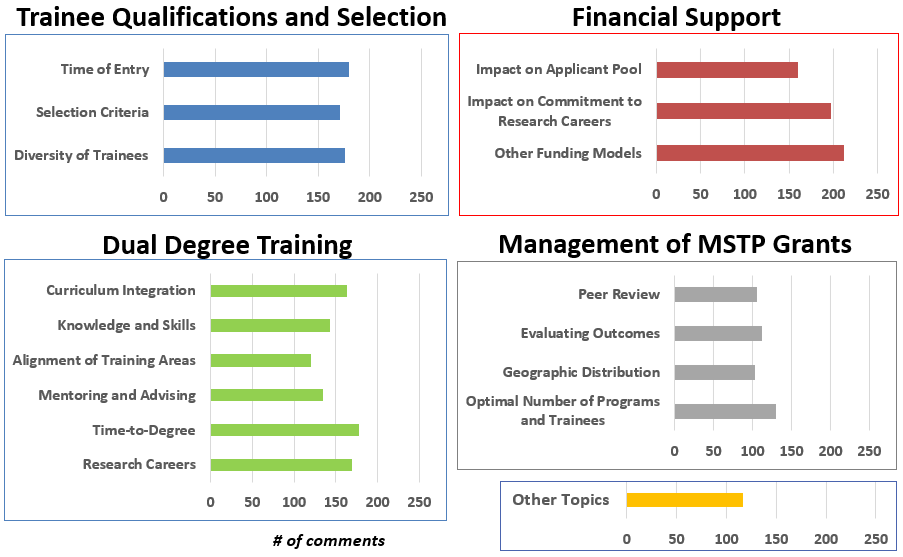This page is historical material reflecting the Feedback Loop Blog as it existed on
January 23, 2018. This page is no longer updated and links to external websites
and some internal pages may not work.
January 23, 2018
Archived: We Asked, You Responded: Community Input on Enhancing the Medical Scientist Training Program
Continuing our efforts to help modernize graduate education, we sought input from the community through a Request for Information (RFI) on strategies to enhance our physician-scientist training grants to medical schools across the country. These grants, funded through the Ruth L. Kirschstein Institutional Predoctoral Training Grant (T32) Medical Scientist Training Program (MSTP), provide M.D.-Ph.D. dual degree students with an integrated program of biomedical sciences and clinical training. The RFI was open from June 9 to August 9, 2017. There were 16 themes in the RFI that were broadly binned into the following categories:
 Figure 1. Number of Comments Received Across the Themes of the MSTP RFI
Given the volume and richness of these responses, we did our best to distill down the comments in the summary report. We appreciate the thoughtful and thorough feedback provided to us through this RFI. These comments will inform us as we develop a new MSTP funding announcement that would incorporate MSTP-specific training needs and align with the new funding announcement for non-MSTP predoctoral training programs funded by NIGMS.
Figure 1. Number of Comments Received Across the Themes of the MSTP RFI
Given the volume and richness of these responses, we did our best to distill down the comments in the summary report. We appreciate the thoughtful and thorough feedback provided to us through this RFI. These comments will inform us as we develop a new MSTP funding announcement that would incorporate MSTP-specific training needs and align with the new funding announcement for non-MSTP predoctoral training programs funded by NIGMS.
- Trainees (e.g., time of recruitment to the MSTP, diversity of the applicant pool, and selection criteria)
- Financing/funding (e.g., how different M.D.-Ph.D. funding models influence the range of institutions that apply for MSTP support, the pool of trainees, and the trainees’ commitment to research careers)
- Dual-degree training (e.g., time-to-degree, integration of curriculum, training areas, mentoring, and career advising)
- NIGMS management of MSTP grants (e.g., size, number, and distribution of training programs; evaluation of outcomes; and peer review)

